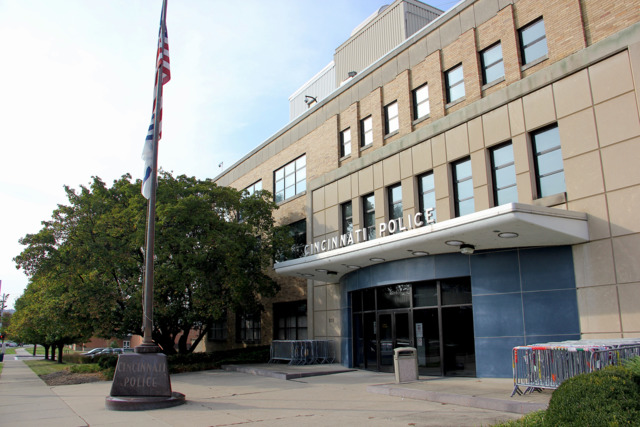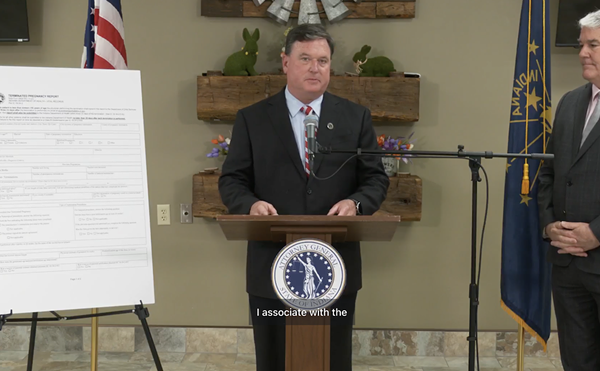Following Ohio Gov. Mike DeWine's Sunday order that all Ohioans stay in their homes except to get food, exercise or medical attention to try to slow the spread of COVID-19, some local law enforcement agencies have announced changes to the way they will operate.
Those include changes in what kinds of calls officers will respond to immediately to preserve personnel and keep officers from possibly contracting the virus. They also include shifts toward more patrol personnel to enforce DeWine's stay at home order — though local officials say arrests are unlikely and not the goal of those patrols.
"This is not about punitive actions," Cincinnati Police Chief Eliot Isaac said Sunday, noting the officers would be out mostly for visibility sake. "This is about compliance."
Mayor John Cranley said that enforcement of the order would mostly apply to businesses staying open when they shouldn't. DeWine ordered all non-essential retail establishments to close Sunday. Cincinnati Police shut down a bar in South Cumminsville last week that ignored a similar order stipulating bars and restaurants can't have dine-in customers.
Cranley also said that officers won't assume someone is breaking DeWine's order just because they're out driving or walking.
"We understand there will be a lot of confusion as to who this applies to," Cranley said Sunday. "We will be taking a cooperative and collaborative approach to enforcing this. But these are now orders. They carry the weight of law."
Elsewhere in the county, other law enforcement agencies are taking a similar approach.
The Hamilton County Sheriff's Office covers all 49 jurisdictions and will enforce the stay at home order.
"When it comes to enforcement, it's common sense that we're going to be practicing and utilizing the least-restrictive intervention," Hamilton County Sheriff Jim Neil said in a press conference on Tuesday. "That's good old-fashioned law enforcement where you're maintaining the peace, dispersing the crowds, educating people and business owners... in effect, warnings to cease and desist behaviors and only taking enforcement actions as a progressive step if there isn't compliance."
Madeira Police Chief Dave Schaefer represents the Hamilton County Police Chiefs Association. That group has been coordinating stay at home enforcement efforts among the county's 42 police departments. Schaefer says that enforcement will be much the same as the sheriff's office.
"There will be no spot checks of people out driving on the roadway," he said at the press conference. "We're going to assume you're out picking up groceries or medications or you're out for a walk."
However, Schaefer said that officers will ask large groups to maintain social distance and that they will be monitoring non-essential businesses that DeWine ordered to shut down.
Operating a non-essential business during the order is a second degree misdemeanor.
"We're going to ask for them to peacefully shut their doors," Schaefer said.
Beyond enforcing DeWine's stay at home order, other changes are underway among local law enforcement.
Last week, Cincinnati Police asked 911 callers to meet responding officers outside their homes whenever possible due to the threat of COVID-19 contagion.
This week, CPD will cease immediate response to less-serious situations for the duration of the COVID-19 crisis, officials say. Those include:
• Reports of breaking and entering in which the suspect is no longer present and recovery of stolen goods is not possible
• Menacing reports in which a suspect is not likely to return. Domestic violence reports are exempt and will still get a response
• Phone harassment
• Thefts under $5,000 when property recovery is not possible, unless the property is a firearm
• Property damage reports or lost property reports
• Dog bites
Cincinnati residents can still file police reports about these incidents on CPD's website.
The sheriff's office and other local law enforcement agencies are taking similar measures. Neil is also working to crank down the number of inmates in the jail.
He says sheriff's deputies will cite and release non-violent offenders whenever possible. Neil's office is also working to cut the Hamilton County Jail's population almost in half.
Neil says the Hamilton County Jail's population today has been reduced to 943 inmates. Yesterday, there were 976. Neil says his office is working as quickly as possible to limit the risk of contagion in the jail.
Just weeks ago, there were 1,611 inmates in the jail. There are roughly 840 cells in the jail.
"That number is shrinking daily," Neil said. "We'll soon be at a number where we can manage that population in single cells."
The reduction in inmates will allow jail personnel to quarantine anyone in the jail who exhibits symptoms of COVID-19. Those entering and exiting the jail are also having their temperatures taken. Any incoming inmate with symptoms will be isolated and monitored by medical professionals.
So far, Neil says, no one in the jail has had symptoms of COVID-19 or tested positive. Officials say they aren't aware of any law enforcement officers who have symptoms of the virus at this time.






